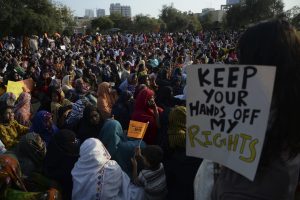On March 8, dozens of Pakistani women in all major cities took to the streets to highlight discrimination, inequality, violence, abuse, and injustices against them and other marginalized communities in the country. Despite threats and right-wing attacks on the Aurat March last year, the demonstrators were resilient and undeterred in putting forward their demands, which emphasized prioritizing healthcare for women during the pandemic and ensuring protection against patriarchal violence among others. But as is all-too-typical for Pakistan, the women’s day demonstration — on the only day when women voice their concerns in large numbers — was met by resistance and a smear campaign.
A disinformation campaign was unleashed on social media with a doctored video purporting to show “blasphemous” slogans taking over Twitter. The video was even shared by some right-wing TV anchors and journalists without fact-checking. A feminist organization, Women Democratic Front’s (WDF), had its flag misrepresented on social media as that of France to portray the movement as anti-Islam, given the anti-Muslim discourse is on the rise in the European country.
When opponents of the march couldn’t justify their anti-women arguments with reason and intellect, they resorted to propaganda – and that too involving extremely volatile and sensitive sentiments around religion and blasphemy in a society where people have been jailed or even killed over such accusations. Clearly certain quarters will go to any lengths to malign the women’s rights campaign without regard for the repercussions the move may have, including endangering innocent lives. The Pakistani Taliban also threatened the march organizers and demanded that the government prosecute them for blasphemy.
The horrific motorway rape incident last year along with the steady stream of honor killings and forced marriages are a shameful reminder of the country’s collective failure to ensure women’s safety. At a time when cases of violence against women have recently doubled, as revealed by a report titled “Tracking Numbers: State of Violence Against Women and Children in Pakistan,” women’s rights campaigns are crucial to highlight atrocities against them.
On the economic front too, Pakistan is one of those countries where limited opportunities are available for women. Just 20 percent of women are part of the workforce in the country, while the pay gap between men and women has also increased. A United Nations Development Program (UNDP) report revealed that Pakistan topped the list of countries holding prejudiced views against women; the percentage of people holding at least one sexist bias was the highest in Pakistan of the countries surveyed, at 99.8 percent.
Despite such worrying statistics and the abysmal state of affairs for women, any attempt to empower and speak up for the female population in Pakistan, whether it’s the global #MeToo movement or the annual Aurat March, has largely been met with sheer ignorance, toxic chauvinism, and intolerance from society at large. Misogynistic, hateful comments on social media and demeaning posts become a regular occurrence every Women’s Day. While elsewhere in the world, people celebrate women’s achievements and advocate for their better representation and rights, in Pakistan the moral brigade takes over to issue judgements on what is socially acceptable and what is not, seemingly protecting the non-egalitarian norms and values that have been largely formulated to control and suppress women and gender minorities.
Several factors have contributed to this backlash and hate against women, who are already greatly discriminated against. Opponents term these yearly marches as un-Islamic and “immoral” based on some of the slogans like “mera jism meri marzi” (my body, my choice”) that are used in marches.
In a country where conservative values are central to the national narrative, this phenomenon traces back to the time of independence. With the demand to have a separate homeland for the Muslims of the subcontinent, religion became the basis for Pakistan’s very existence. Thus non-egalitarian religious nationalism has always been at the core of society’s values. The rise of fundamentalist leaders, however, especially military dictator Zia-ul-Haq’s Islamization and the absence of real democracy, meant that these values got instilled deeper and deeper into the country’s social fabric and were started getting misused to maintain a certain balance of power. Rules have been made by men for men.
Feminist scholars argue that there are “limits to Muslim women’s piety” – again, as defined by men in patriarchal societies – and there is a need to promote the potential for females’ autonomy and liberal freedoms in such societies. Pakistani women are now standing up to intimidation, injustice, and an environment of fear and inequality. They demand autonomy and structural and transformational changes. In doing so, they are seen as challenging male dominance, and are therefore bearing the brunt of online vitriol and smear campaign from all corners

































